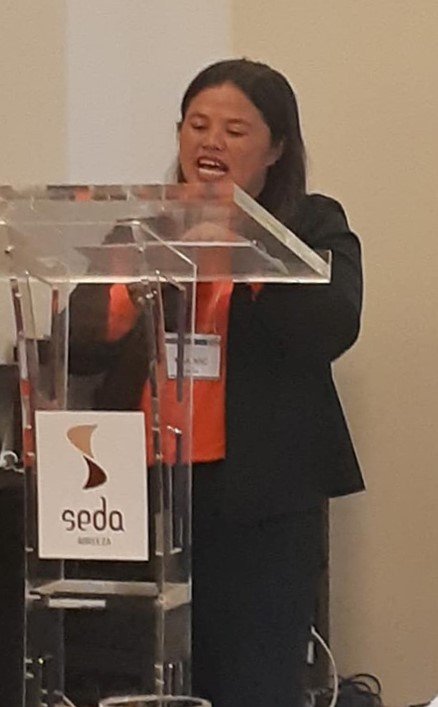INCLUSIVE DEVELOPMENT THROUGH SPECIALTY COFFEE IS PROMOTED IN DAVAO CITY

Last Thursday, 08 August 2019, Joji Pantoja, our CEO, represented PBCI-CFP Inclusive Development Consulting Team at a Specialty Coffee Forum held in Seda Hotel, Davao City. The purpose of the forum was to promote local tourism through culture and coffee.
Marivic’s Importance in the Value Chain

The highlight of the event was the inspirational message of Marivic Dubria, President of Balutakay Coffee Farmers Cooperative (BaCoFa Coop), and who was also the 2019 Philippine Coffee Quality Competition champion in the Arabica category. Marivic and her colleagues at BaCoFa have been our farming community partners since 2013.
She shared her story on the challenging journey in producing specialty coffee. “I never imagined that a farmer like me,” she said, “would be able to go to the United States because of the quality of our coffee.” Marivic narrated how the coffee traders used to dictate the price of their coffee because they did not know their importance in the value chain. “Then we learned to process our coffee and the discipline it takes to produce specialty coffee,” she continued. That was the beginning of the liberation of her and her fellow coffee farmers in Balutakay from the exploitative traders who used to buy their coffee cherries at a command price. Now that they have post-harvest processing skills, they have a choice to sell cherries, green beans, or roasted beans through fair trading.
Marivic narrated the same story in a video produced by Asian Development Bank.
The organizers gathered various participants and presenters that include roasters, traders, and processors of roasted coffee beans. Each presenter was given limited time to cover their respective company or business profile, products, services, volume of roasted coffee beans per month, product quality, contact information. Each presenter was also allowed to use a short company video.
Suppliers was given a space to display a small banner, leaflets, and calling cards on table provided for the companies in the side of the plenary hall. A separate meeting with each of the potential suppliers were scheduled. A series of separate buyer-supplier meetings were facilitated after the forum.
This event was organized by the Department of Trade and Industry in Region XI (DTI XI) and the Agricultural Cooperative Development International – Volunteers in Overseas Cooperative Assistance (ACDI-VOCA).
Culture and Peace
For us, this means Culture of Peace and Reconciliation envisioned, strategized, and operationalized through Coffee for Peace — our social enterprise.

CFP participates in these kinds of events from the perspective of our journey as part of a peacebuilding movement.
When we think of culture, we imagine the worldviews, the value systems, and the behavior patterns of people and communities. But we also imagine ‘peace’ saturating the whole culture. That’s what we mean by ‘culture of peace.’
Peace is harmony with our Creator, our being, our neighbors, and our environment. This view of peace prompted us to establish this social enterprise we now proudly call Coffee For Peace (CFP).
CFP started as an Income Generating Program (IGP) of the PeaceBuilders Community, Inc. (PBCI)—a Mennonite peacebuilding movement in the Philippines that exists (a) to train and multiply effective Peace and Reconciliation (PAR) Team Leaders; (b) to support the leaders in organizing and nurturing their respective PAR Teams; (c) to establish contextually-relevant PAR Communities; and, (d) to develop a Network of PAR Communities.
To enable PBCI to become self-sustainable, an IGP was created to support its mission.
However, due to the organic social involvement of CFP, it became a separate business entity with the following mission:
- To protect and enhance the environment
- To walk with the farmers as they strive to improve their lives
- To support the peacebuilders on the field.
Coffee for Peace has been training farmers on Arabica production, the principles of fair trade, trading policies and pricing since 2007. Aside from working in Mindanao, CFP has also trained coffee farmers in the Cordilleras and Western Visayas and is looking forward to train more in the different provinces of the Philippines.
